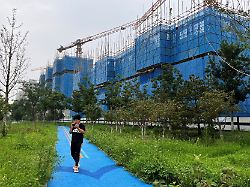Creditors avert failure
Payment deferral for Chinese real estate group
9/2/2023 1:27 p.m
The Chinese construction industry has evidently put the boom years behind it for the time being. The former largest real estate developer Country Garden also feels this. He can repay debts later, but there is still a risk of insolvency.
Heavily indebted Chinese real estate group Country Garden has received approval from its creditors to delay a major debt repayment – averting a default for the time being. As the financial news agency Bloomberg reports, the creditors voted on Friday evening that Country Garden only has to repay a tranche of 3.9 billion yuan (498 million euros) in 2026. The company initially did not confirm the report.
The payment of the 3.9 billion yuan was actually due in the coming days. However, even after the postponement that has now been approved, the risk of insolvency for Country Garden remains.
The deadline for paying interest on two loans expires next week, so that the equivalent of 20.8 million euros will be due. At the beginning of August, Country Garden was unable to pay the installments and was given a 30-day grace period, which ends on Tuesday.
Default becomes more likely
Country Garden is one of the most important construction companies in China. By the end of last year, the company had accumulated 1.43 trillion yuan in debt. On Wednesday, the company reported another 48.9 billion yuan in losses for the first half of 2023. A default for the company, which employs tens of thousands of people, would have tangible consequences for China’s economy and beyond.
The rating agency Moody’s further downgraded Country Garden’s creditworthiness this week, from Caa1 to Ca. Investments in the Chinese group are therefore rated as “highly speculative” where “a default or very near default is likely”.
Forbes magazine ranks Country Garden among the 500 largest companies in the world. Until recently, CEO Yang Huiyan was the wealthiest woman in Asia, and the company was long considered financially stable despite the problems in the real estate industry.
The construction sector in China had been booming since the late 1990s, but many entrepreneurs were becoming increasingly indebted. In 2020, the authorities enacted measures to stop over-indebtedness. Since then, large property developers have often not been able to complete projects.
